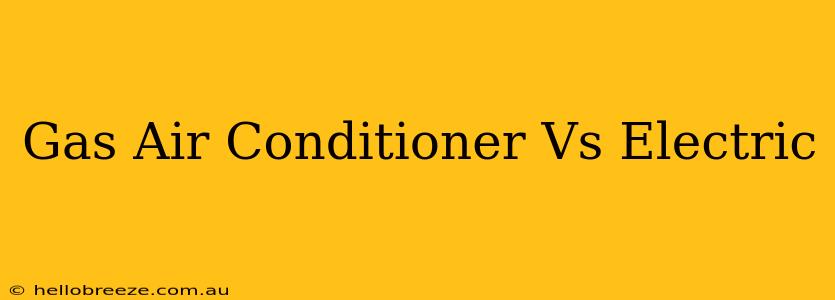Choosing the right air conditioning system for your home or business is a crucial decision. Two popular options are gas air conditioners and electric air conditioners. Both offer cooling, but they differ significantly in their energy sources, operating costs, environmental impact, and suitability for various situations. This comprehensive guide will delve into the key differences between gas and electric air conditioners to help you make an informed choice.
Gas Air Conditioners: A Deep Dive
Gas air conditioners, also known as gas-powered air conditioners or propane air conditioners, utilize propane or natural gas as their primary energy source. This contrasts sharply with electric AC units, which rely entirely on electricity.
Advantages of Gas Air Conditioners:
- Energy Independence: One major advantage is their independence from the electrical grid. During power outages, a gas air conditioner can continue to operate, providing crucial cooling when you need it most. This is a significant benefit in areas prone to power disruptions.
- Lower Electricity Bills (Potentially): Depending on your local energy prices, gas can sometimes be cheaper than electricity. This can lead to lower operating costs, especially in areas with high electricity rates. However, this needs careful consideration based on individual pricing structures.
- Environmentally Friendly (Potentially): While both systems have environmental impacts, gas-powered AC units, particularly those fueled by natural gas, may have a smaller carbon footprint than some electric AC units depending on the electricity source. This depends on the electricity generation methods of your region.
Disadvantages of Gas Air Conditioners:
- Higher Initial Costs: Gas air conditioners typically have a higher upfront purchase price compared to electric models.
- Installation Complexity: Installing a gas AC unit requires specialized expertise due to the need for gas lines and safety considerations, potentially increasing installation costs.
- Fuel Costs and Availability: The cost of propane or natural gas can fluctuate, impacting operating expenses. Availability may also be a concern depending on your location.
- Maintenance and Repairs: Gas air conditioners often require more specialized maintenance and repairs compared to electric models.
Electric Air Conditioners: A Detailed Look
Electric air conditioners, the most common type, utilize electricity to power their cooling systems. They are widely available in various sizes and configurations to suit diverse needs.
Advantages of Electric Air Conditioners:
- Lower Initial Costs: Electric AC units generally have a lower initial purchase price.
- Easy Installation: Installation is typically simpler and less costly than gas models, requiring less specialized expertise.
- Wide Availability: Electric air conditioners are readily available from numerous manufacturers and retailers.
- Technological Advancements: Electric AC technology is constantly improving, leading to greater energy efficiency and innovative features.
Disadvantages of Electric Air Conditioners:
- Vulnerable to Power Outages: Their primary drawback is their dependence on electricity. Power outages render them inoperable.
- Higher Electricity Bills (Potentially): Electricity costs can be substantial, particularly in areas with high energy rates. This can lead to higher operating expenses compared to gas AC in areas with cheaper gas prices.
- Environmental Impact: The environmental impact of electric AC depends entirely on your region's electricity generation mix. If your electricity comes from fossil fuels, the carbon footprint will be higher than a gas AC powered by natural gas in many cases.
Gas Air Conditioner Vs Electric: The Verdict
The best choice depends entirely on your individual circumstances. Consider the following factors:
- Your Budget: Initial costs and ongoing operational expenses should be carefully evaluated.
- Your Energy Costs: Compare local electricity and gas prices to determine the most economical option.
- Your Location: Power outage frequency and the availability of gas are critical factors.
- Environmental Concerns: Evaluate the carbon footprint of both options based on your region's energy sources.
Ultimately, a thorough assessment of your needs and a comparison of the long-term costs and benefits of each system will guide you to the most appropriate choice for your air conditioning needs. Consulting with a qualified HVAC professional is always recommended for personalized advice.

